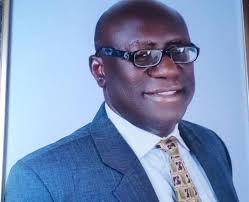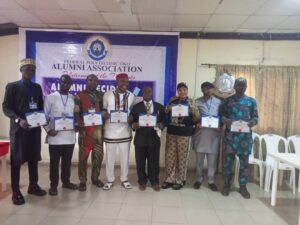Work Ethics and Organizational Growth: The Performance Management Perspective- C. Don Adinuba

Hon. C. Don Adinuba
Text of a lecture by C. Don Adinuba, Commissioner for Information & Public Enlightenment, Anambra State, at the Annual Lecture of the Anambra State Chapter of the Chartered Institute of Personnel Management held on Tuesday, December 10, 2019, at the Auditorium, Nnamdi Azikiwe University, Awka, Anambra State.

It is my honour to be in your midst today. Since I relocated to Awka in March, last year, to serve my state, I have received quite a number of invitations to speak at public forums on diverse issues. For some reason, this is the second one I have accepted. I hope this lecture will be rewarding enough an experience.
I thank officers of the Anambra State Chapter of the Chartered Institute of Management (CIPM), led by Onyekacki Muora, for its confidence in me. It would seem that the primacy of human being in development in an organization or the larger society is gaining recognition. In its 1990 publication under the title, Report to the South, the eminent men and women who worked at the South Commission on how developing nations of the world could fast track their economic progress described the human being as “both the means and end of development” and should, therefore, be treated with dignity.
There was no controversy about this conclusion. Yet, it has not always been like this. Until a few decades ago, finance was considered the most important factor in development. Employees at American auto firms, for instance, were treated more or less like slaves. They had practically no rights. The wages were scandalously poor, they had no leave allowances and they worked for very long hours.
The factories were just sweatshops. Neither finance nor natural endowments can take the place of human beings in development. Japan, Israel, South Korea, Hong Kong, Taiwan and Singapore have practically no mineral deposits, yet they are among the most developed countries and territories in the world. Japan’s condition is exacerbated by such natural calamities as earthquakes and Tsunamis.
Nature is so hostile to Singapore that the water which the people drink is up to this day imported from neighbouring Malaysia. What has happened in each of these places is that through education, training and retraining, the people have learnt to squeeze water out of stone, and consequently enjoy the highest living standards across the globe. In contrast, countries like the Democratic Republic of Congo enjoy superabundant natural resources, but they are mired in old sorrows of history like hunger, starvation, malnutrition, illiteracy, ignorance, superstition, etc, because their human resources are not developed and turned into powerful economic agents.
Human resource researchers acknowledge that the most competitive organizations are those which pay particular attention to their human resources. In a popular paper published in 1997 as “Introduction to General Management” in the book, The Complete MBA Companion: The Latest Management from the World’s Leading Business Schools, Professor Ross A. Webber of Wharton Business School at the University of Pennsylvania wrote:
“… of the chief executives of 1,000 most valuable US companies, only one has a functional background primarily in human resource management.
“….Today, among the chief executives of the 1,000 most valuable US companies, 264 are from finance backgrounds, 217 from marketing, 193 from engineering/technical, 144 were company founders, 110 from production/manufacturing, 73 from law and 7 from corporate planning. “And not a few Japanese observers have commented on American and European inadequacies in human resource management. In a typical Japanese company, the senior human resource executive may be second in influence only to the chief executive officer”.
Ethics and other Social Questions in Human Development In recognition of the primacy of developed human resources in organizational and societal growth, attention has in recent times been paid to what is popularly known as human capital development, that is, the development of the skills and knowledge of organizational or societal members. This is the practice also in Africa. Very little attention is paid to social values. Yet, poor social values are a huge hindrance to progress in Africa, whether in the private or public sector.
The Anambra State Chapter of the Chartered Institute of Personnel Management, therefore, deserves commendation for including ethics in the topic for the 2019 annual public lecture. Without getting our values right, rapid economic progress will be tough. After all, many of us know of people who graduated with distinction from top universities and are very knowledgeable in the true sense of the expression but when given organizations to run based on their technical competence and fine qualifications on paper, they ruined them on account of personal greed.
A highly respected Harvard alumnus was given a huge amount by a leading entrepreneur to invest for him in the stock market, he diverted the money. He went to jail. Cases of ethical issues are rampant in Nigeria. When we speak of unethical practices by organizational members in Nigeria, we often refer to their absenteeism, truancy, inefficiency, colluding with outside forces to rip off their organizations, outright stealing, a profound lack of patriotism, tampering with official documents, a gross inability to abide by financial regulations, nepotism, and an inability to keep official secrets as well as bribery and corruption. Many Nigerians seem to believe that these vices are more pronounced in the public sector than in the private sector.
This is likely to be true. Even so, the presence of unethical practices on an industrial scale in the Nigerian public sector is a tragedy of colossal consequence. In some countries, the most gifted and patriotic citizens frequently choose to work in the civil service, even though the pay is not as competitive as the pay in the private sector. An example is Singapore. Lee Hsen, the first son of Lee Kuan Kuan Yew, the legendary prime minister from 1965 to 1990, broke all records in the mathematics department at Cambridge. He could have chosen to become a world class academic, but he opted for the artillery corps in the national army of his newly independent country where he felt his service was more needed, and from the army he joined the civil service. He was to become his country’s prime minister decades later. In the United Kingdom and Japan, only the brightest rise to the top echelon in the civil service.
Those who graduate in Philosophy, Politics and Economics (PPE), originally known as modern greats, from such universities as Oxford and the London School of Economics become permanent secretaries in Britain, a practice reminiscent of how graduates of grande ecole Sciences Po in Paris dominate public life in France. (It is instructive enough that in the United States PPE is taught at Yale and the University of Pennsylvania as Ethics, Politics and Economics). Only outstanding persons work in the Ministry of Finance or the Ministry of Economy, Trade and Industry or the old Ministry of International Trade and Industry in Japan because the authorities understand that even a little policy error by a top bureaucrat in any of these ministries can cause the country to lose its competitive edge in international trade to any of the numerous rival trading nations.
Therefore, to maintain the competitive edge or even improve on it, only the very best are deployed to the key ministries. Time was when Nigeria used to have exceptionally brilliant people and patriots in the civil service. People like Phillip Asiodu who studied the modern greats at Oxford, Jerome Udoji who read law at Cambridge and Alison Ayida who went to Oxford and the London School of Economics as well as Ahmed Joda immediately come to mind. We should not forget that Dim Emeka Ojukwu, whose father was arguably Nigeria’s wealthiest man in the late 1950s, joined the Eastern Nigerian civil service after graduating from Oxford with a master’s degree in modern history.
He could have chosen to join the father’s enterprise at the top. When the Ojukwu left the civil service, he joined the army for obviously patriotic purposes. As he himself explained on various occasions, Ojukwu found army more attractive because it was national; the Eastern civil service where he was working was regional. It is usual to attribute the dramatic collapse of the performance of Nigerian civil servants, including in ethics, to two major events in our recent national history. The first is the compulsory retirement of outstanding civil servants, including those reputed as super permanent secretaries, and the general purge by the General Murtala Muhammed military regime in 1975/6 as part of the reform process of the Nigerian public service.
The purge meant that career stability, the hallmark of the civil service, was gone. The result was a high level of corruption arising out of fear of possible abrupt career end. The second dramatic development was the reform of the civil service by the General Ibrahim Babangida regime in 1988. A key feature of the reform was what the regime called politicization of the civil service. Permanent secretaries became political appointees and named directors general. The reform was not popular, and so was abolished by a later administration. To understand the social or ethical milieu in which the Nigerian civil servants and other organizational members in Nigeria work, it is appropriate to take into consideration the cultural values of contemporary Nigerian society.
Here is a cursory look at the prevailing dominant social values. Nigeria and the Crisis of Social Values Nigeria is a good example of what the preeminent American social scientist, Edward Banfield, called in his 1958 seminal work, The Moral Basis of a Backward Society, a low-trust society. A society is considered low-trust when it has a low stock of values like integrity, honesty, loyalty, transparency and trust. Scholars like Robert Putnam and Francis Fukuyama have demonstrated that high-trust societies make faster economic progress than low-stock ones. As Fukuyama notes in his 1997 book, trust is not just a social virtue but also the basis of creation of prosperity. Trust is regarded by some scholars as the faith that someone will not take advantage of you even when you are vulnerable. After visiting Nigeria in January, 1966, just before the January 196 military coup military d’etat, the visiting Singaporean prime minister expressed shock to hear a senior Nigerian minister proudly announce to visiting heads of state and presidents attending the Commonwealth summit in Lagos that he banned shoe importation so that his personal factory would prosper at the expense of the people he was serving.
Lee concluded, as he wrote in his world famous memoir, From the Third World to First: The Story of Singapore from 1965to 1990, that the Nigerian people must have a strange set of cultural values and a stranger set of ethical standards for their leaders. In a wall publicized interview in the late 1990s between Henry Louis Gates, the highest paid African American scholar at Harvard, and Colin Powell, who had retired as the first African American Chairman of the Joint Chiefs and was to become the Secretary of State under President George W. H. Bush, Powell described Nigerians as marvellous scammers, attributing the proclivity toward fraud to Nigeria’s national cultural values. David Cameron, a former British prime minister, is famed to have called Nigeria fantastically corrupt. And the current prime minister, Boris Johnson, is reported to have accused young British men and women 20 years ago in an article in The Spectator newspaper of having “a Nigerian interest in money”, referring to a terrible kind of greed.
In his 2014 ambitious and wide ranging book on the theory of political development, Political Order and Political Decay: From the Industrial Revolution to the Globalization of Democracy, Fukuyama writes ruefully about Nigeria’s corruption, noting “When we turn to turn to the African country of Nigeria, …. we observe … corruption of an entirely different kind of magnitude and, correspondingly, one of the most tragic development failures in the contemporary world”. Fukuyama cites the example of a Nigerian state governor who literally drove away a major Western investor from his state for refusing to bribe him with a huge amount of money meant for foreign direct investment in his state. Nigerians seem to be in agreement that their countrymen and women are obsessed with materialism at all levels of society.
In a well received lecture at the 30th Convocation ceremony of the University of Lagos entitled Crisis in the Temple, Pius N C Okigbo, Nigeria’s most decorated economist, used facts and statistics to demonstrate that even tertiary institutions had become very materialistic. Gone were the days, according to the economist, when Nigerian universities were conferring honorary doctorates on intellectuals and truly outstanding persons; they were now giving such honours mostly to men and women of power and women. During the Sani Abacha military regime, we saw how universities, polytechnics and colleges of education were falling over themselves to dole out honours to barely literate ministers like Jeremiah Useni and Dan Etete. The crisis of values in Nigerian higher institutions is far worse today than when Okigbo delivered his famous lecture on the crisis in the temple in 1992.
Sex for grades is now, of course, commonplace. Social commentators and columnists like Okey Ndibe accuse universities of bestowing on some ladies what they memorably call sexually transmitted degrees (STDs). The BBC recently brought this phenomenon to the fore with dramatic force when its investigative journalists did undercover work at the University of Lagos and the University of Ghana at the Legon. Earlier the University of Ibadan had been rocked by the scandal of an accounting professor demanding sex from his female postgraduate student before she could pass his course. All three male professors mentioned above in connection with gross misconduct have been disciplined accordingly.
Unethical Practices and the Challenge of Performance Management As is well established by researchers of the role of cultural values in the performance of organizations, a lot of organizational values are a reflection of the values in the larger society. A society with a large stock of social capital is likely to have organizations with the right corporate cultural values. In contrast, a high-trust society is likely to have organizations with substantial stocks of values like trust, loyalty, obedience, transparency and integrity. It is not fortuitous that most of the organizations with high ethical standards are found in developed countries. Much as it is admitted that Nigerian organizations are not really expected to be as ethically high as firms in Japan, Denmark, Sweden and the United States because of the larger cultural milieu in which they operate, there is a lot organizational leaders can do to bring unethical conduct to the minimum. A major step can be found in the performance management strategy.
It is important to state here that performance management should not be confused with performance assessment or evaluation. Whereas performance assessment usually occurs once in a year and is used for administrative purposes like staff promotion or demotion, performance management is a strategic issue used to make individuals and teams contribute significantly and in a never-ending manner to the competitive performance of an organization. In line with the current thought in management science against tall hierarchy, performance management practitioners advocate that organizational leaders and their followers work in close collaboration so as to achieve organizational goals effectively and efficiently.
Class and status differences are played down on as much as possible. This situation makes for greater communication and engenders trust, one of the greatest requirements for leadership, alongside good communication skills and the ability to be a team player. When followers trust their leaders or their organization, they can work with passion, which leads to super delivery. Yet, no person should be under any illusion that it will be easy to achieve this kind of close cooperation between a leader and his or her follower in a culture like ours which the great Dutch social psychologist, Geert Hofstede, author of Culture’s Consequences: International Differences in Work-related Values, famously calls a society with high power distance index. In the 1980 path breaking work which has been revised twice, Hofstede explains power distance as the difference in values between, on the one hand, people with power or authority or wealth or fame and, on the other, those without power and the people at the receiving end do not consider the huge difference as something abnormal which should be fought. In other words, our people are too deferential to those with power.
It is difficult to see organizational members call their leader by the first name. Yet, performance management experts expect the relationship between a leader and his or her followers to be so close that they address each other by the first name. In the seminal 2004 book, which took 90 scholars from 62 cultures 10 years to produce on the effects of cultural values on different leadership styles, Robert House of Wharton Business School and his team categorized Nigeria and other African countries as practitioners of what they called the self-protective leadership style which is characterized by, among other factors, a high level of class and status consciousness. Our leaders in both the private and public sectors are traditionally aloof from their followers.
Therefore, to get them to change this practice which is quite engraved in our culture will be no tea party. What is more, Nigeria is a deeply religious country. Many parents are very conservative as regards relationships. They are likely to object to a situation which makes a male leader in the workplace tend to get close to their daughter in the name of working towards the realization of organizational goals. This is all the more so in Northern Nigeria where a man is not allowed to shake hands with someone’s wife because conservative Islam is dominant there. Despite these threats or risks, performance management is the way to go. Its benefits are many. For instance, it encourages such modern practices as coaching and mentoring.
A coach is someone who has been assigned a person or a group of persons to train in a specific area while a mentor is someone who inspires a person through the way he or she works or relates to others, etc. Leading performance management scholars like Herman Aguinis recommend that a coach keep a log or record of the performance of each follower, though they caution against including unnecessary material. When a follower is not doing the job well, the person has to be corrected gently, better privately, so that the person will not lose face, as the Chinese call it. A good leader has to find out why the job is not being done and address the problem from the source, which may be have to do with a family issue. Before a follower is given a target, for instance, performance management researchers advise that the follower sit down with the leader and agree on a realistic target once the necessary resources are provided.
This is in sharp contrast to the current practice in most Nigerian banks where a manger unilaterally and arbitrarily gives an underling an unrealistically huge amount to bring in every month as deposit or lose his or her job. The practice causes immense frustration and makes many staff members engage in all manner of unethical practice. It is likely that the targets will be met if subordinates are consulted before the targets are set. When the subordinates fail to meet targets they willingly agreed on and they get punished, they would understand and feel less bitter. When subordinates are consulted before a target is set, they feel recognized, or, as we usually say in Nigeria, feel carried along.
The sense of ownership in every enterprise is critical. It induces organizational members to strive to achieve what at the beginning may look impossible, but at the end is achieved. This idea is now known as stretch, a term used for the first time in the 1990s at General Electric when the legendary Jack Welch was the chairman. It may be pointed out here that stretch is often facilitated by what applied psychologists call deliberate practice, that is, a person who wants to achieve excellence has to put it in more effort than most rivals and competitors. Many intellectuals and writers like Malcolm Gladwell, author of Outliers, believe that those who achieve global excellence usually put in at least 10,000 hours of practice, whether in music or sports or any other field.
Another important recommendation from performance management experts is that supervisors evaluate their underlings and the underlings, in turn, assess their superiors. This suggestion may sound outlandish in Nigeria and other societies known for high power distance index and the self-protective leadership style which emphasizes class and status consciousness. In our society, a supervisor is not assessed by his or her subordinate. Our practice has to give way to the new way of doing things. The traditional practice encourages acute dictatorship and gross abuse of office. It is one major reason why university lecturers demand sex for marks and fail students who do not share their views on intellectual or academic issues, and there are hardly consequences. In contrast, in places like the United States a lecturer cannot have his or her appointment confirmed unless the students evaluate him or her favourably.
This is important because, apart from making for democracy, it shows whether a lecturer discharges his or her leadership duty responsibly. In some Western organizations, such stakeholders as the host community and distributors and suppliers join in the evaluation process. This broad participation in the performance evaluation is known as the 360 degree assessment. It is important that Nigerians heed the advice of performance management experts that organizations and governments take performance evaluation more seriously than we have always done. Many people just fill performance assessment forms perfunctorily, that is, without commitment.
The result is that they do not provide information which organizations need to get members to perform optimally. I have seen managers deliberately give false assessments of their subordinates for all kinds of reasons, including nepotism and the desire to be seen as nice persons. Perhaps more than any other branch of management science, performance management focuses on two organizational things which, despite their critical nature for organizational growth and development, are often misunderstood even by world-class organizations like Pepsi Cola. They are mission and vision statements. A mission statement contains the core business of an organization, the values which drive the organization and its commitment to environmental protection, including the kind of technology it utilizes. It is often long.
A vision statement tells what an organization or government or society seeks to achieve within a timeframe. Examples are Malaysia’s Vision 2020, Saudi Arabia’s Vision 2030, Nigeria’s Vision 2010 and Anambra State’s Vision 2070. Malaysia seeks to become a fully developed nation by year 2020, as South Korea, Hong Kong, Taiwan and Singapore have become. Saudi Arabia, whose economy runs almost solely on oil, is working to make oil become an insignificant contributor to its national wealth by 2030. Nigeria under the Sani Abacha regime developed a strategic plan to make the country become a medium economic power in 2010. And in November, 2019, the Anambra State government set up a committee headed by Charles Chukwuma Soludo, a widely respected economist and former Central Bank governor, to develop a strategic plan to make Anambra attain the status of a fully developed place by year 2070. Conclusion and Recommendation Ethical issues are a grave problem in Nigerian organizations.
This is a reflection of the crisis of values in the larger Nigerian society. A new kind of orientation in Nigeria is needed critically. We can start with education. Courses and subjects like Civics, Ethics, Business Ethics and Ethics in Public Administration should be compulsory right from primary school and all the way to the first two years in every tertiary institution. Students should be made to understand the correlation between unethical behaviors and organizational and societal progress. The arguments in books like Edward Banfield’s The Moral Basis of a Backward Society, Francis Fukuyama’s Trust: The Social Values and the Creation of Prosperity, as well as Lawrence E. Harrison’s and Samuel P. Huntington’s Culture Matters: How Values Shape Human Progress should be made known to all and sundry. The need for leadership by personal example cannot be overemphasized. Leadership does not refer to only those holding high positions in government but also to those in the private sector. A person does not need to hold a position to be considered a leader. All he or she requires to be considered a leader is the capacity to influence any person. There is always a huge gap between what leaders in our society say in public and what they actually do.
At the organizational level, the problem of unethical practices in Nigeria can be reduced considerably through the adoption of measures like the performance management strategy which stresses the importance of ethical conduct in business. Unknown to most Nigerians, ethics are a vital component of corporate social responsibility (CSR). Many people think that CSR is only about giving back to society. This thinking is in error. An organization cannot be considered socially responsible if it is not ethical not only in the manner it conducts its business internally but also in its relationship with partners like suppliers. Volkswagen of Germany suffered severe reputational damage when it was discovered that it installed a software programme which gave false information about the emission level from its vehicles. Nestle of Switzerland suffered a reputational crisis when it was revealed that it was benefitting from child labour because the firm supplying it cocoa was getting it from Ivorian farms using underage children. Employee satisfaction is a key component of a socially responsible organization. Organizational members have to be well paid and given good conditions of service. Members must have prospects of career progression. And discriminations of grounds of gender, race, faith, etc, cannot be condoned. Its values have to be observed as an article of faith. As part of its corporate social responsibility, every organization has to demonstrate commitment to environmental protection, including the kind of technology it uses. Scientists and statesmen accept that the planet Earth is threatened through wrong use of resources. Every ethical organization must be committed to safer environmental practices and greater environmental aesthetics. When an organization embraces performance management, it creates a new corporate culture.
Supervisors and subordinates work more collaboratively as a team. When a member starts to deviate from acceptable behaviours and engages in malpractices like truancy, absenteeism, bribery and corruption, stealing of official documents, nepotism, sexual harassment, gender discrimination, collusion with external forces to undermine their organisation and other serious ethical breaches, it will be detected early enough and appropriate action taken. Organizations which are soft on ethical issues cannot function competitively. Enron, one of the world’s biggest energy trading firms, collapsed on December 2, 2001, following a series of ethical breaches. A number of Nigerian banks like Inter Continental Bank failed in the last few years over professional misconduct by its senior executives. It is not only organizations which collapse or experience stunted growth on account of poor values. Governments and societies fail their people when they are mired in unethical conduct. As we have shown in this lecture, societies with high stocks of social capital succeed far more than low-trust ones. Our own state of Anambra is a good example.
Not only ago, salaries could not be paid and schools were shut down for a long period because our beloved state was in the vice grip of those who proudly claimed to be the state’s godfathers but were famously described by Chinua Achebe as renegades. They took the official governor-elect in the dead of the night to a notorious shrine to swear to an oath of perpetual and uncritical allegiance to them, so that he could hold the cow of Anambra State while they milked it dry. They abducted the governor and falsely announced his resignation from office. They burnt state symbols for a whole three days in broad daylight and committed other forms of sacrilege. Anambra was, in the words of a former governor, “a failed state”, even though the expression is used more appropriately in international relations to refer to countries, rather than sub nations, which do not have internationally recognized governments and where no government has control over the whole of a given country and where countries cannot meet their obligations to international organizations like the African Union and where governments cannot meet their contractual obligations to citizens and contractors.
The good news is that today the same state has become the most competitive state in the country, the safest, the most peaceful, the most stable and the most united, famous for social cohesion and social harmony. It is ahead of other states in various fields. This is the difference the right values in leadership make. For Anambra State, it is, as Achebe would say, still morning yet on creation day. I thank you all for listening.









